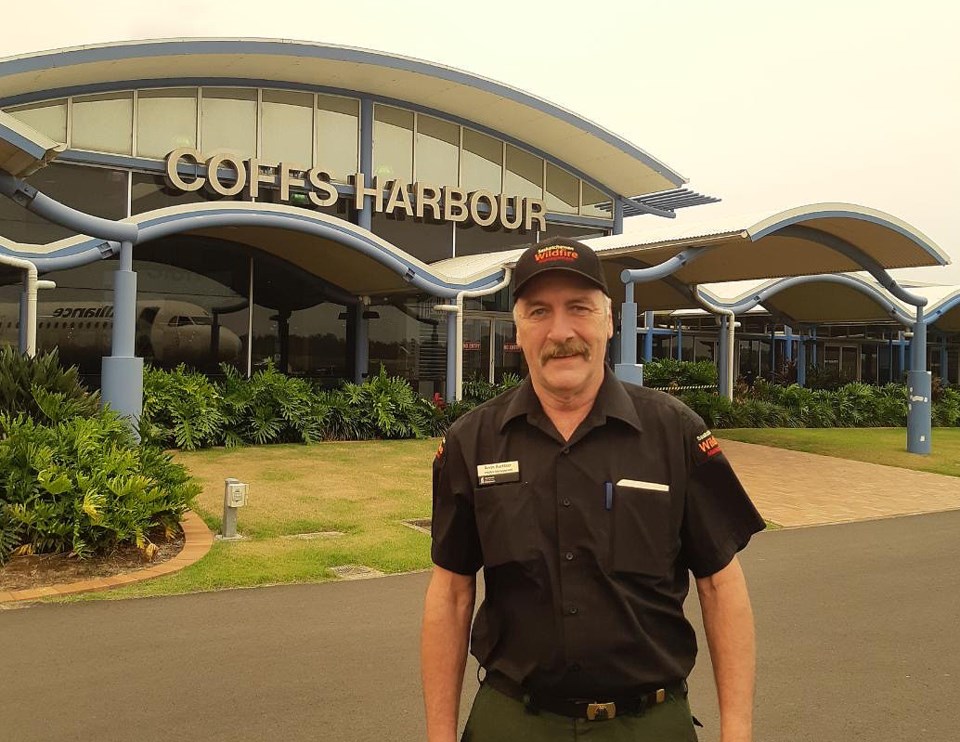An area wildland firefighter is back home after spending more than a month fighting bushfires in Australia.
Kevin Buettner works as a fire technician at the Denare Beach Forest Protection Base, working with the provincial public safety agency. When the call comes, he’s typically among the first firefighting personnel in Saskatchewan to travel to fight blazes. Working mostly in operation, he’s travelled throughout western Canada and the U.S. fighting fires – 2000 in Montana, 2014 in Oregon, three separate tours in B.C. and, closer to home, fighting prominent fires like those around La Ronge in 2015 and the Granite fire in 2017.
When Buettner first heard about the Australia fires on the news, he wanted to help.
“People asked, ‘Why would you volunteer for that?’ It’s what I do. It’s what I’ve done for 40 years now. It’s not anything new. The timing is a little different, but when they’re in need, they’re looking for bodies to fill that. You pretty much have to go and get help where we can,” he said.
“It was just relief for those guys. They’ve been going hard for two months over there, and they’re just getting into their summer.”
During recent severe fire situations closer to home, including large-scale forest fires in British Columbia, Australian firefighters have come to Canada to help the battle. For Buettner and for others, heading to Australia was about returning the favour.
“They’ve been over here three of the last four years. We've always had a fairly good rapport with them coming up now. This is the first opportunity for us, as a Canadian agency, to go over there. Twice now, when I’ve been fighting fires in B.C., I’ve turned it over to Australian teams.”
Buettner headed to Australia in early December as part of the first crew of Canadians to hit the ground down under. He was one of the first who volunteered to go.
Stationed in New South Wales, Buettner fought the fires for 38 days before returning home early this month.
“It’s hard to even get your mind around the size of it. When I went, there were 20 of us who went over there through CIFFC (Canadian Interagency Forest Fire Centre). Twenty of us went on the first go and we were split into four groups. We were basically on the one fire, some of us on the one side, kind of all the way around the fire,” he said.
The scale of devastation is unlike anything Buettner had seen before. As of Jan. 20, nearly 20 million hectares of land, including thousands of buildings and homes, had burned to ash.
“When I measured, the one that we were on was about 500 kilometres long. It’s only 700 across the province. That’s one. They’ve got 10 or 12 of these things going just in New South Wales. Now Victoria is starting up, now Western Australia is starting up. The sheer size of it is mindblowing,” Buettner said.
At least 20 people, along with likely hundreds of thousands of animals, have died as a result of the fires. A sizable chunk of the area burned in New South Wales was due to the fire Buettner was assigned to fight.
“If you think, in our country, if we had a fire from here to Prince Albert or from here to La Ronge, continuous, it would shock you. It’s up to around five million hectares burning now,” he said.
In Australia, Buettner mainly served as a plant manager, coordinating heavy equipment like bulldozers, loaders, water trucks and excavators for use on the fire line. Later in his stint, Buettner worked in what is called “make safe” – rehabilitating roads and removing debris and detritus from areas firefighters needed to access.
There are differences that had to be overcome for Buettner – not the least of which was learning some of the local slang, used not only by residents but by some of the Australian “fireys”.
“I got a list of all the terms and what they actually mean. It’s about three pages long,” he joked.
“Anywhere in Australia, even if we were in the community, people would go, ‘Oh, you’re the guys from Canada!’ and come up and talk to you and thank you. We get into the airports and you’re getting ovations on the airplane, they’d announce that they were transporting the Canadians back – of course, we’re on an Air Canada flight, but still.”
A more difficult change is the difference in vegetation – with a number of eucalyptus and gum trees and long-term drought conditions, fire can travel and grow fast.
“There’s this gum tree that’s got a real loose bark – that's where they get all these ember showers from. The rates of which fire will take off and spread seems a lot worse over there,” he said.
“Compound that with the fact they’re in a two-year drought. What’s typically rainforest and often flooded is now burning. They’ve never had fire in that valley or in that area like this, because the fire comes off the ridge, comes down the hill, hits the rainforest and it stops. Now, it’s so dry in there that it goes right through it, out the other side and keeps on going.”
Back at home, Buettner said he wouldn’t rule out returning to Australia to help out. More Canadian fire personnel are willing to go help, but some Saskatchewan fire personnel have stayed home to prepare for the coming forest fire season at home.
Buettner thanked his family for being by his side throughout the travel and long hours, both at home and abroad.
“If they’re still looking for people and and the calls keep coming, I’d consider going. I said ‘the first thing is, my wife has to approve it,’” he said.




